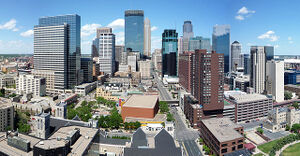Minneapolis (nonfiction): Difference between revisions
(Created page with "'''Minneapolis''' (Listeni/ˌmɪniˈæpəlɪs/) is the county seat of Hennepin County,and larger of the Twin Cities, the 14th-largest metropolitan area in the United States, c...") |
No edit summary |
||
| (9 intermediate revisions by the same user not shown) | |||
| Line 1: | Line 1: | ||
'''Minneapolis''' (Listeni/ˌmɪniˈæpəlɪs/) is the county seat of Hennepin County,and larger of the Twin Cities, the 14th-largest metropolitan area in the United States, containing approximately 4.1 million residents. | [[File:Minneapolis.jpg|thumb|Minneapolis.]]'''Minneapolis''' (Listeni/ˌmɪniˈæpəlɪs/) is the county seat of Hennepin County,and larger of the Twin Cities, the 14th-largest metropolitan area in the United States, containing approximately 4.1 million residents. | ||
Minneapolis lies on both banks of the Mississippi River, just north of the river's confluence with the Minnesota River, and adjoins Saint Paul, the state's capital. | |||
The city is abundantly rich in water, with twenty lakes and wetlands, the Mississippi River, creeks and waterfalls, many connected by parkways in the Chain of Lakes and the Grand Rounds National Scenic Byway. | |||
It was once the world's flour milling capital and a hub for timber, and today is the primary business center between Chicago and Seattle, with Minneapolis proper containing America's fifth-highest concentration of Fortune 500 companies. | |||
Minneapolis | Minneapolis' name is attributed to Charles Hoag, the city's first schoolteacher, who combined ''mni'', a Dakota Sioux word for water, and ''polis'', the Greek word for city. | ||
== In the News == | |||
<gallery> | |||
File:O Canada.png|link=Canada (nonfiction)|[[Canada (nonfiction)|Canada]], [[Minnesota (nonfiction)|Minnesota]]'s neighbor to the North. | |||
</gallery> | |||
== Fiction cross-reference == | |||
* [[Gnomon algorithm]] | |||
* [[Gnomon Chronicles]] | |||
Minneapolis | * [[Minneapolis is the Tip of the Liberal-Stabbing Spear]] | ||
* [[New Minneapolis, Canada]] | |||
== Nonfiction cross-reference == | == Nonfiction cross-reference == | ||
* [[ | * [[26th and Bloomington (nonfiction)]] | ||
* [[Minnesota (nonfiction)]] | * [[Minnesota (nonfiction)]] | ||
== External links == | == External links == | ||
| Line 33: | Line 32: | ||
* [https://en.wikipedia.org/wiki/Minneapolis Minneapolis] @ Wikipedia | * [https://en.wikipedia.org/wiki/Minneapolis Minneapolis] @ Wikipedia | ||
[[Category: | [[Category:Nonfiction (nonfiction)]] | ||
[[Category:Minneapolis (nonfiction)]] | |||
Latest revision as of 06:13, 7 October 2020
Minneapolis (Listeni/ˌmɪniˈæpəlɪs/) is the county seat of Hennepin County,and larger of the Twin Cities, the 14th-largest metropolitan area in the United States, containing approximately 4.1 million residents.
Minneapolis lies on both banks of the Mississippi River, just north of the river's confluence with the Minnesota River, and adjoins Saint Paul, the state's capital.
The city is abundantly rich in water, with twenty lakes and wetlands, the Mississippi River, creeks and waterfalls, many connected by parkways in the Chain of Lakes and the Grand Rounds National Scenic Byway.
It was once the world's flour milling capital and a hub for timber, and today is the primary business center between Chicago and Seattle, with Minneapolis proper containing America's fifth-highest concentration of Fortune 500 companies.
Minneapolis' name is attributed to Charles Hoag, the city's first schoolteacher, who combined mni, a Dakota Sioux word for water, and polis, the Greek word for city.
In the News
Fiction cross-reference
- Gnomon algorithm
- Gnomon Chronicles
- Minneapolis is the Tip of the Liberal-Stabbing Spear
- New Minneapolis, Canada
Nonfiction cross-reference
External links
- Minneapolis @ wiki.karljones.com
- Minneapolis @ Wikipedia

